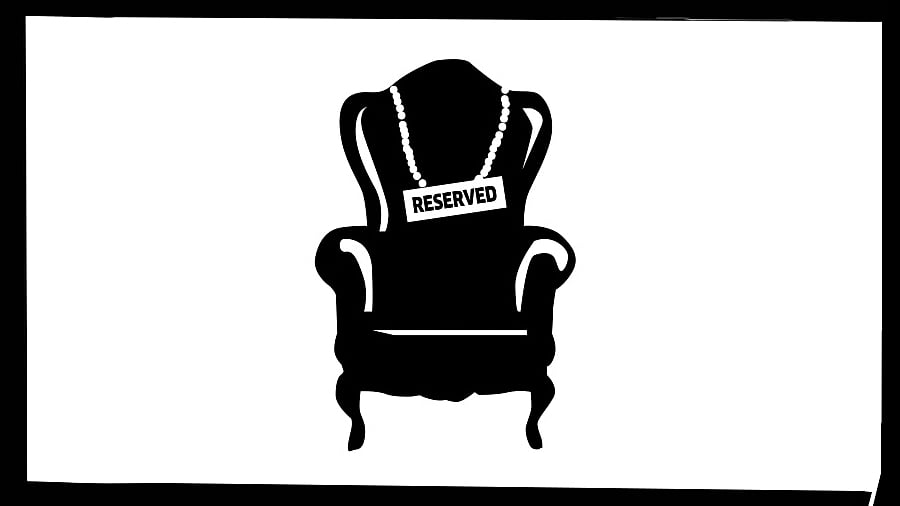
Dynasty in Indian politics is a phenomenon we have quietly learned to live with. Of course, we all agree that it shouldn’t exist, and we also publicly affirm that leadership should be based on ability, not ancestry. However, during every election season, we see the same old surnames bloom on posters, and we continue to elect them. Shashi Tharoor, Congress MP, recently wrote in his Project Syndicate essay that political pedigree still trumps merit, and when surnames stand in for substance, the quality of governance inevitably suffers. True. But the bigger question is this. If dynasty is such an obvious flaw, why does it not just survive but thrive?
No doubt, Tharoor is right in his assertion that dynastic politics is a grave threat to Indian democracy. He goes on to add that it’s not a Congress-only problem. Across India’s political landscape, political succession has often resembled the reading of a family will rather than a democratic process. Consider these examples, which are all too familiar to us. In Maharashtra, the Thackerays have passed the baton from Bal to Uddhav to Aditya. In Tamil Nadu, the Karunanidhi clan continues through Stalin and Udhayanidhi. In Bihar, the Paswans have inherited the Lok Janshakti Party; in Punjab, the Badals dominate the Akali Dal; in Telangana, the KCR family runs the show. From the DMK and BRS to the SP and Shiv Sena, politics increasingly resembles a family tree more than a contest of ideas. It is also common knowledge that Tharoor’s own party, the Congress, practically wrote the manual on political inheritance. Sure enough, his appeal now to “trade dynasty for meritocracy” has bruised the party’s high command and, worse, handed the BJP an easy talking point. The ruling party quickly turned his words into a jab at Rahul Gandhi, insisting that every other party but theirs is a family firm.
However, the numbers tell a different story. According to an analysis by the Association for Democratic Reforms (ADR), one in five Indian lawmakers is a dynast, and nearly 17% of them belong to the BJP. So, if Congress is the face of dynasty with 32%, the BJP is its quiet custodian. Curiously, though, Tharoor’s essay spares the BJP the scrutiny he applies to others. Perhaps that’s because the BJP’s dynasty runs on a different fuel. It does not always rely on bloodlines as much as on ideological inheritance and inner-circle loyalty. There may be no sons and daughters at the topmost position, but power still flows through tightly guarded networks of patronage. Nepotism wears saffron too, just that it is better disguised.
So, what does the persistence of dynasties reveal about voters and politicians? The most certain thing is that Indian voters have grown accustomed to political inheritance. In many states, politics follows the same caste and kinship patterns. Voters treat family names like trusted brands. In a vibrant democracy, with newer parties entering the fray regularly and with the ever-shifting promises, a familiar surname feels like a safe bet. Voters who accept the father often accept the son as well. Consequently, familiarity outweighs competence, and parties oblige because a specific surname saves them the effort of building credibility from scratch. It’s a silent pact between ambition and habit. Leaders and voters agree to keep that cycle intact.
The surname sells
Interestingly, there’s also a gender twist that complicates things. Nearly half of India’s women legislators, ADR reports, come from political families. Daughters, wives, and widows are often held up as symbols of women’s empowerment. But what kind of empowerment depends on a surname? While dynasty often serves as a gateway for women to enter politics, it also reinforces old hierarchies that block genuine equality. In fact, it clearly reflects India’s democratic paradox: an advancement for women but built on inherited privilege.
At the same time, it must be remembered that not every dynast is undeserving. Some have indeed evolved into competent, even visionary leaders. To dismiss them solely because of birth would be unfair. However, we must not forget that democracy is about fairness and not just competence. It’s about making sure anyone, regardless of origin, has a genuine chance to rise on merit. When that space is dominated by family-backed politicians, democracy loses its character as a public institution and becomes a gated community of privilege.
So why does the system persist? Because it works, at least for those who benefit from it. Parties want candidates who can win, not those who merely deserve to. Dynasts bring money, networks, and name recognition. Add caste and community loyalties, and the formula is unbeatable. Perhaps, until campaign financing is cleaned up, internal elections are truly representative, and voters demand more than just surnames, dynasty will remain the default setting. Reforms such as term limits and internal democracy could help, but what India really needs is a cultural shift in how it perceives leadership itself. It would be wishful thinking to believe that dynasty will disappear anytime soon. It’s too deeply rooted in our political culture, feeding on the needs of parties, the loyalties of communities, and the insecurities of voters. What may change is its form, not its presence.
Dynasty has been shamed often, but never dismantled. It endures because it benefits everyone in some way, and even those who denounce it often fall in line when opportunity knocks. Tharoor’s call for merit in politics is timely and necessary. Even so, India’s democracy continues to suffer this contradiction, perhaps not for lack of imagination, but out of fear of the chaos the alternative may bring. So, for now, bloodlines will shape ballot lines, and we will continue to choose familiarity over freedom.
(The writer is an educator and political analyst based in Bengaluru)
Disclaimer: The views expressed above are the author's own. They do not necessarily reflect the views of DH.